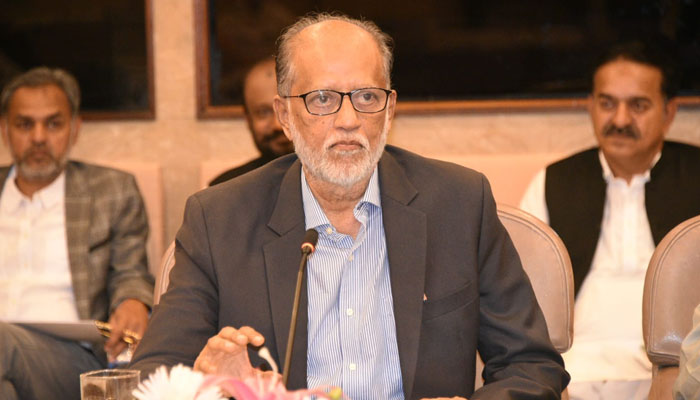NA panel asks FBR to issue SRO to bring steel sector in EFS
Committee also supported a Rs2.6 billion refund claim by Utility Stores Corporation (USC) against FBR
ISLAMABAD: A parliamentary panel Wednesday pressed the Federal Board of Revenue (FBR) to issue a Statutory Regulatory Order (SRO) within two days to bring the iron and steel sector into the fold of the country’s flagship Export Facilitation Scheme (EFS).
With the sector’s exports already clocking $1.5 billion, lawmakers say FBR’s inaction risks choking momentum. Chaired by MNA Syed Hafeezuddin, the committee also supported a Rs2.6 billion refund claim by Utility Stores Corporation (USC) against FBR and called for referring FBR’s Rs18 billion counterclaim to the Alternative Dispute Resolution Committee (ADRC).
“If we provide any relief to Utility Stores, we risk facing legal action,” warned FBR Chairman, adding that funds under dispute affect provincial shares as well. Yet, he pledged to present the committee’s recommendations to the finance minister.
MNA Muhammad Mobeen Arif said that the Export Facilitation Scheme (EFS), originally designed to allow duty-free import of raw materials for value-added exports. Its exports had touched $1.2 billion under the scheme before a handful of exporters challenged it in FBR, claiming it harmed the metal sector. “The FBR quickly drafted a summary and sent it to the cabinet,” said Mobeen. The cabinet later formed a committee to review the scheme. “The core issue is the implementation of that cabinet decision,” he emphasized.
FBR chairman criticized the scheme outright, calling it “a flawed model,” and alleged that the steel sector had lobbied its way into the program despite being a net-negative exporter. Still, he assured the committee that FBR would fully comply with the cabinet’s directives.
To enhance efficiency in industrial development, the committee constituted a sub-committee to audit the operational structure and performance of the Small and Medium Enterprises Development Authority (SMEDA) and the Pakistan Industrial Development Corporation (PIDC).
Lawmakers expressed alarm over weak pharmaceutical regulation in the Islamabad Capital Territory (ICT), where just six inspectors oversee 670 registered companies. A proposal for additional appointments is under cabinet review.
The National Fertilizer Corporation (NFC)—despite operating profitably with over 1,600 dealers—will be wound up, the committee was informed, due to the absence of an effective regulatory framework.
The committee also examined complaints from Karachi’s industrial sector over not receiving Rs40 billion in subsidies during the pandemic. “Every industrial region was given subsidies except Karachi,” said Chairman Hafeezuddin.
Instead of offering relief, K-Electric had obtained a stay order from the Islamabad High Court, he added. “This issue has now been taken up by the Special Investment Facilitation Council (SIFC),” he informed.
-
 King Charles' Andrew Decision Labelled 'long Overdue'
King Charles' Andrew Decision Labelled 'long Overdue' -
 Timothee Chalamet 'forever Indebted' To Fan Over Kind Gesture
Timothee Chalamet 'forever Indebted' To Fan Over Kind Gesture -
 Columbia University Sacks Staff Over Epstein Partner's ‘backdoor’ Admission
Columbia University Sacks Staff Over Epstein Partner's ‘backdoor’ Admission -
 Ozzy Osbourne's Family Struggles Behind Closed Doors
Ozzy Osbourne's Family Struggles Behind Closed Doors -
 Dua Lipa Claims Long-distance Relationship 'never Stops Being Hard'
Dua Lipa Claims Long-distance Relationship 'never Stops Being Hard' -
 BTS Moments Of Taylor Swift's 'Opalite' Music Video Unvieled: See Photos
BTS Moments Of Taylor Swift's 'Opalite' Music Video Unvieled: See Photos -
 Robin Windsor's Death: Kate Beckinsale Says It Was Preventable Tragedy
Robin Windsor's Death: Kate Beckinsale Says It Was Preventable Tragedy -
 Rachel Zoe Shares Update On Her Divorce From Rodger Berman
Rachel Zoe Shares Update On Her Divorce From Rodger Berman -
 Kim Kardashian Officially Takes Major Step In Romance With New Boyfriend Lewis Hamilton
Kim Kardashian Officially Takes Major Step In Romance With New Boyfriend Lewis Hamilton -
 YouTube Tests Limiting ‘All’ Notifications For Inactive Channel Subscribers
YouTube Tests Limiting ‘All’ Notifications For Inactive Channel Subscribers -
 'Isolated And Humiliated' Andrew Sparks New Fears At Palace
'Isolated And Humiliated' Andrew Sparks New Fears At Palace -
 Google Tests Refreshed Live Updates UI Ahead Of Android 17
Google Tests Refreshed Live Updates UI Ahead Of Android 17 -
 Ohio Daycare Worker 'stole $150k In Payroll Scam', Nearly Bankrupting Nursery
Ohio Daycare Worker 'stole $150k In Payroll Scam', Nearly Bankrupting Nursery -
 Michelle Yeoh Gets Honest About 'struggle' Of Asian Representation In Hollywood
Michelle Yeoh Gets Honest About 'struggle' Of Asian Representation In Hollywood -
 Slovak Fugitive Caught At Milano-Cortina Olympics To Watch Hockey
Slovak Fugitive Caught At Milano-Cortina Olympics To Watch Hockey -
 King Charles Receives Exciting News About Reunion With Archie, Lilibet
King Charles Receives Exciting News About Reunion With Archie, Lilibet




